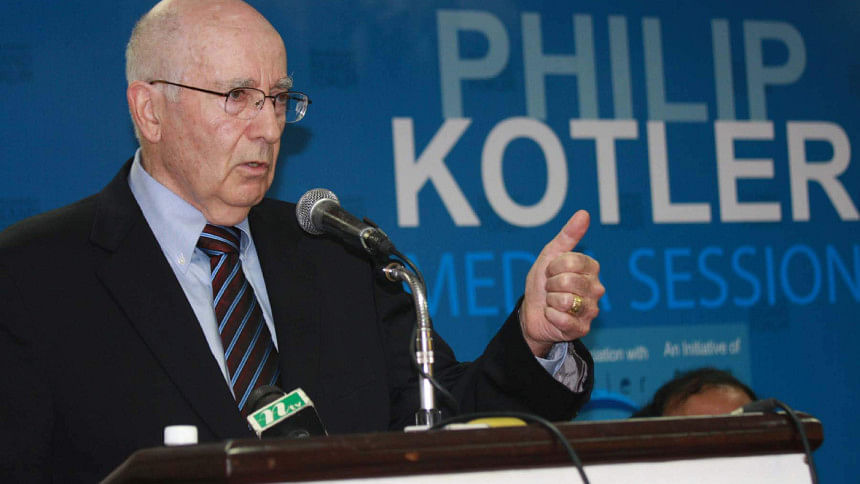The journey of marketing

Marketing is dead, says Kevin Roberts, former CEO of Saatchi and Saatchi Worldwide – one of the world's largest, most reputed marketing groups based in the UK.
Addressing a group of senior business leaders attending a convention in London in 2012, this advertising kingpin also said – strategy is dead, management is dead.
In isolation, these comments portray a pessimistic Kevin. To understand the context of such comments, we have to explain today's time in a complete different perspective.
Many experts describe today's world as VUCA -- volatile, uncertain, complex and ambiguous. According to Kevin, this is not just a VUCA world, this is a super VUCA world.
Things change at unprecedented speed, courtesy of the advancement of technology. At such turbulent times, the traditional ways of doing things might not always guarantee success. With the emergence of internet, consumers are much more aware of the facts and can take informed decisions. Fierce competition among businesses and globalisation also aggravate the prevailing uncertainties. As a result, experts are coming up with different approaches to deal with these challenges.
Kevin suggested that we need to power things up and speed things up. Speed and velocity are two important aspects of business today. The job of marketing is to create movement and inspire people to join you.
"The difference between rational thinking and emotional thinking is that rational thinking leads to conclusions and meetings and more meetings. Emotional thinking leads to action," he said.
Marketers should now focus more on telling stories, sensitising customers and building intimacy with them.
Philip Kotler, the famous marketing guru, had come up with some pragmatic perspectives in his book titled 'Marketing 3.0: From Products to Customers to the Human Spirit' to deal with the present challenges being faced by the businesses.
The concept of marketing over the years has evolved around three phases.
The first phase started way back at the time of industrialisation. During that period, marketing was all about selling products to the target consumers. There was hardly any focus on understanding the actual needs and wants of the customers. This phase was better described by Henry Ford, the founder of the famous Ford Motor Company, "Any customer can have a car painted any colour he wants, so long as it is black."
Marketers, at that time, used to put emphasis on the techniques of how to persuade customers so that deals happen. Kotler termed this phase as Marketing 1.0 or in other words 'product' centric marketing.
As time progresses, competition starts creeping in. More and more companies started offering similar products, resulting in a number of alternatives for the consumers. Businesses were slowly realising the importance of reaching out to its target consumers. The emphasis shifted from merely selling products to first creating awareness among the customers.
Advertisement and promotion became critical to reach out to the target groups. The concept of 'branding' emerges. To differentiate goods and services being offered, marketers started focusing on various tools like pricing, packaging and distribution.
Experts summarise these as '4 Ps of marketing – product, price, place and promotion'. This is regarded as Marketing 2.0 or 'customer' centric phase.
Surely, today's consumers are not only satisfied with their functional or emotional fulfilment; they consciously look for the fulfilment associated with human spirit from the products or services they select. Issues like environment, labour rights, and corporate social responsibility are becoming important factors influencing consumers in their purchase decisions.
According to Stephen Covey, a whole human has four basic components: a physical body, a mind capable of independent thought and analysis, a heart which can feel emotion, and a spirit -- your soul or philosophical centre.
Customers are shifting towards companies that are fulfilling the deepest of needs associated with removing some of the anxieties about making the world more liveable. Kotler has termed this paradigm shift as 'Marketing 3.0" or 'human' centric marketing.
While both Marketing 2.0 and Marketing 3.0 aim to satisfy consumers' needs and wants, marketing 3.0 treats consumers holistically, giving more importance to aspects like their mind, heart and spirit.
Enterprises are thus trying to engage with consumers more intensely, involving them in designing the products or services, also known as co-creation, and thereby giving an impression of engagement and empowerment to its consumers.
Scott Stratten in his book 'UnMarketing: Stop Marketing, Start Engaging' suggested that companies nowadays should start treating their customers 'as if she is your mother'.
Affection, love, joy, authenticity, empathy, compassion, soulfulness are some of the most critical and deep rooted things that, in fact, drive human beings. Not many businesses have been mindful about these aspects of human life.
Different studies revealed that, the companies with passion and greater purpose are endeared by the customers. Amazon, Apple, Best Buy, Honda, Toyota, Whole Foods, Starbucks, Commerce Bank are some examples of such corporations that had adopted the concept of winning the hearts of customers. These companies are highly profitable as well.
Research findings show that not only do they have happy and loyal customers, their employees are more fulfilled, they have innovative and profitable suppliers and they also have environmentally healthy communities. All these factors actually lead to sustainability.
More and more companies are heading towards embedding social causes into their marketing and campaign strategies.
A few examples would be -- Best Buy promoting 'recycle used electronics', Kraft talks about 'reducing obesity', General Motors focusing on a complete different dimension, 'traffic safety', while British Airways sponsoring 'children in need'.
Many experts believe that success in the future would largely depend on how enterprises build their brands and entire organisations around a serious, deep purpose — an ultimate concern — and then effectively translate that purpose to people with different worldviews and perspectives.
The writer is the managing director of Syngenta Bangladesh Ltd.

 For all latest news, follow The Daily Star's Google News channel.
For all latest news, follow The Daily Star's Google News channel. 



Comments